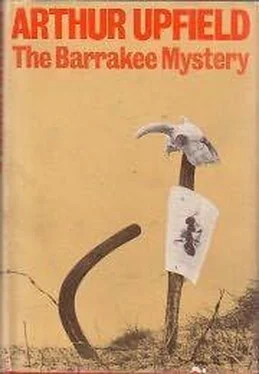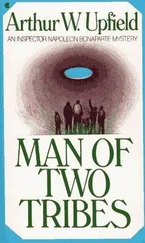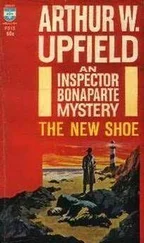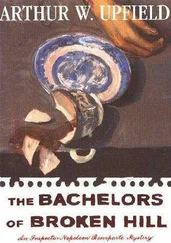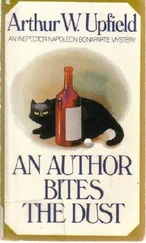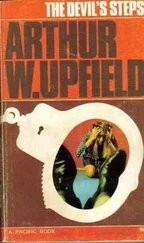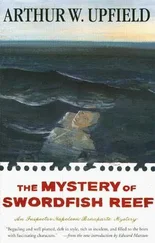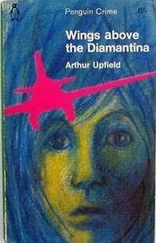Arthur Upfield - The Barrakee Mystery
Здесь есть возможность читать онлайн «Arthur Upfield - The Barrakee Mystery» весь текст электронной книги совершенно бесплатно (целиком полную версию без сокращений). В некоторых случаях можно слушать аудио, скачать через торрент в формате fb2 и присутствует краткое содержание. Жанр: Классический детектив, на английском языке. Описание произведения, (предисловие) а так же отзывы посетителей доступны на портале библиотеки ЛибКат.
- Название:The Barrakee Mystery
- Автор:
- Жанр:
- Год:неизвестен
- ISBN:нет данных
- Рейтинг книги:4 / 5. Голосов: 1
-
Избранное:Добавить в избранное
- Отзывы:
-
Ваша оценка:
- 80
- 1
- 2
- 3
- 4
- 5
The Barrakee Mystery: краткое содержание, описание и аннотация
Предлагаем к чтению аннотацию, описание, краткое содержание или предисловие (зависит от того, что написал сам автор книги «The Barrakee Mystery»). Если вы не нашли необходимую информацию о книге — напишите в комментариях, мы постараемся отыскать её.
The Barrakee Mystery — читать онлайн бесплатно полную книгу (весь текст) целиком
Ниже представлен текст книги, разбитый по страницам. Система сохранения места последней прочитанной страницы, позволяет с удобством читать онлайн бесплатно книгу «The Barrakee Mystery», без необходимости каждый раз заново искать на чём Вы остановились. Поставьте закладку, и сможете в любой момент перейти на страницу, на которой закончили чтение.
Интервал:
Закладка:
The reason for this difference in status is no mystery. Australia’s mounted police are recruited frombushmen. Whilst not attracting gentlemen adventurers, as similar organizations in other dominions may do, the force does attract sound men from a community that contains ninety-nine per cent natural gentlemen.
A farmer often lives all his life on his little farm; the city-dweller all his life in one suburb. Beyond the suburb and the farm the world is a myth. With the majority ofbushmen, however, the restless nomadic habits of the blacks they have displaced have eaten into their vitals. Even the semi-civilized blacks must go on a walkabout when the call is heard; and it is the same call which urges a bushman suddenly to leave his job, break for the nearest hotel to spend his cheque, and then take his walkabout before settling again for a little while in a new job.
The walkabouts cover in many cases hundreds ofmiles, and in a few years make the man familiar with all the States. His mind is broadened by travel and fresh human intercourse. His philosophy is one of simple happiness. The amount of his reading isprodigious, the range of it is wide.
Such, then, is the material that goes to make an inland policeman. The class and the police-court mould the recruit’s speech as the riding-master weans him from his easy seat on a horse to military stiffness. The force finishes his education, so well begun by the walkabouts.
Thornton and the sergeant were standing beside the latter’s car after tea. The sergeant was in plain clothes, but there was no mistaking the soldier-policeman in his upright figure and keen face.
“What do you think of Bony?” he asked, with a smile.
“I think him the most extraordinary man I have ever met,” Thornton replied. “He knows as much about the Emperor Napoleon as he does about boomerangs and playing on a gum leaf.”
The sergeant chuckled.
“He asked me once who I considered the greatest man who ever lived, and when I named Jesus Christ he said solemnly: ‘Jesus is the Son of God; but the first Emperor Napoleon was the God of the French nation’.”
“I fully believe it,” the squatter said thoughtfully. “He was giving me a lecture on boomerangs the morning after he came here and, my wife happening to join us, I introduced him to her, wholly, I think, on account of his name. She, too, is a great admirer of the Little Corporal. Yes, he’s an astonishing person.”
“I had a letter two days ago from a brother-in-law who is an inspector at Charleville, Queensland,” said the sergeant. “He said he had heard that Bony was being sent here on this case, and gave me rather a good history of him.
“For many years he was a black tracker in the far west of that State, but before that he earned the degree of an A. at Brisbane University. Do you remember the case of the kidnapping of the Governor’s daughter whilst the vice-regal party were touring North-West Queensland?”
“I do.”
“It was Bony who got the child back from the outlaw gang, and Bony who led the police almost across the Northern Territory to West Australia after the gang, which they caught. They offered Bony membership in the police force, and Bony told them he was not a policeman but a detective. Somehow, he thinks the two quite different. The Governor saw him about it, and Bony said that his gifts and his education entitled him, at the lowest, to the position of detective-sergeant. They gave it him.
“Today he ranks as detective-inspector and, as I told you in my letter, is the very finest bush detective in the Commonwealth. He’s married to a half-caste, and has three children. They, and his wife, live on a ten-acre block of dense tea-tree scrub not far out of Brisbane, and once every year the whole family roll up their swags and accompany Bony on his annual walkabout.” The sergeant lit his pipe and climbed into the driving-seat, and then added: “Yes, they think a lot of Bony in Queensland. My brother-in-law told me he’s never failed in a case.”
“He must be a good man.”
“By all accounts he is. You see, he’s a specialist in bush-craft and in the black fellow’s psychology, neither of which a white man will ever be expert at. Well, goodbye! You might have Bony with you some time, but he’ll surely win.”
The sergeant drove away on the down track, and the squatter sauntered into his office. There he rang up Thurlow Lake, and asked for Ralph.
“Well, how is it, Ralph?” he asked, when the young man spoke.
“Good as gold now, Dad.”
“I am glad of that. Has Dug arrived? I sent him this morning with a load of rations on the truck.”
“No, he is not here yet. What time did he leave?”
“About nine. It’sthree now, so he should be about due. Look here, Ralph!” The squatter’s voice dropped to a whisper. “Can you walk easily now?”
“Yes, oh, yes!” murmured the young man.
“Well, you had better come in tomorrow with Dug. Your mother is getting anxious about you. Mind, not a word about that fool ride of yours.”
“All right, Dad, I’ll remember.”
“Good lad! Bye-bye!”
The squatter rang off and turned to signing cheques made out by the bookkeeper. After that he put on his felt and walked down to the shearing-shed, more to fill in time than for any purpose.
The next morning, early, Black, the jackeroo, drove him and Kate to Wilcannia, where, his turn due, he occupied the Bench and gave judgement in a few “d. and d.” cases and a matter of infringement of one of the countless motor laws.
In consequence, the Little Lady was sitting alone that afternoon on the wide veranda, waiting to give Ralph afternoon tea. She had heard the arrival of the big two-ton truck, followed by the voice of her beloved boy whilst on his way to the bathroom. Now, with eager expectation on her kindly face, and carrying the scent of garden flowers wherever she went, she made one of her sudden resolutions.
And then all at once the light went out, for two strong hands slipped round her head and covered her eyes. A face was pressed to her greying hair, and from its depths a low, harsh voice demanded:
“Guess, Madam, who I am.”
“Ralph!” was her instant reply.
Over her left shoulder appeared the young man’s face, his eyes dancing, his white teeth revealed by a light smile. Quickly turning, her hands went up to his head, and they kissed.
“Mother mine!” he murmured, embracing her. Then he snatched a chair close to her and, searching her face with his eyes, added:
“You are not lookingso well as I would like you to look, Little Lady. I must tell Dad about it, and get him to take you to Sydney for a holiday before the lamb-marking.”
“It’s your imagination, dear. I feel quite well,” she assured him.
“A nice restful holiday with the sea-breeze blowing in your face will bring the roses back, anyway.”
“Silly! I’m too old to have roses in my cheeks.”
Their conversation was interrupted by the arrival of Martha with the tea-things. When Mrs Thornton saw her huge bare feet, she sighed audibly. It was Martha who spoke first, hurriedly, as though quite prepared with a very excellent defence.
“Missy,” she rolled out, “that there Bony he go plant-it my boots. I bin give him cup of tea, and now him gone.”
“You get on his tracks, Martha, straight away,” laughed Ralph. “Take a waddy with you and wallop him.”
“Minetinkit I knock off his plurry head,” Martha replied ferociously, and thundered away-to find her best elastic-sided brown boots on a kitchen-chair. How was she to know that Bony wanted one of them for a particular purpose?
“This Bony appears to be somewhat of a character, Mother,” remarked Ralph over his tea.
“He’s quite a character,” she said. “Kate and I saw your father talking to him near the boats he is repainting, and, like women, as we wanted to know what they were talking about for such a long time.. .” She told the lad the half-caste’s explanation of his name, ending by saying softly: “Bony and I found that we had a bond of sympathy.”
Читать дальшеИнтервал:
Закладка:
Похожие книги на «The Barrakee Mystery»
Представляем Вашему вниманию похожие книги на «The Barrakee Mystery» списком для выбора. Мы отобрали схожую по названию и смыслу литературу в надежде предоставить читателям больше вариантов отыскать новые, интересные, ещё непрочитанные произведения.
Обсуждение, отзывы о книге «The Barrakee Mystery» и просто собственные мнения читателей. Оставьте ваши комментарии, напишите, что Вы думаете о произведении, его смысле или главных героях. Укажите что конкретно понравилось, а что нет, и почему Вы так считаете.
